Posted: June 2nd, 2014 | No Comments »
I’m obviously always interested in just how many copies China books really sell – I have a theory (which I guess I could check if I had access to Bookscan and similar sales data) that China books generate a lot of buzz but, with the exception of a few, don’t always deliver in volume sales terms – i.e. people gas a lot about new China books, review them, go to events around them, but don’t always actually read them. I’m not sure this was true historically though and so a little factoid of interest I came across the other day. Last year I blogged about Henry Champly’s Le Chemin de Changhai (Road to Shanghai: White Slave Traffic in Asia, as the English edition was called). In the 1903s it sold very well indeed and does contain some interesting information and anecdotes if you can past the racism, Yellow Peril, anti-Semitism and hectoring. Interestingly, I recently read (courtesy of Michael Miller’s excellent Shanghai on the Metro: Spies, Intrigue and the French Between the Wars) that the French edition sold over 100,000 copies.
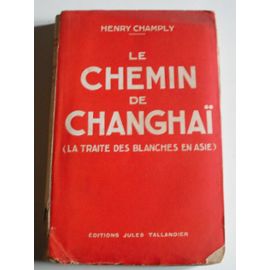

Posted: June 2nd, 2014 | No Comments »
A quick plug for Adam Brookes’s new contemporary Beijing-set spy thriller Night Heron which really delivers. I think most China Hands have been somewhat repeatedly disappointed by the recent crop of PRC-set thrillers with none quite hitting the mark, but Brookes, it appears, has pulled it off. Anyway, I’ve reviewed in more detail over at the Los Angeles Review of Books here. I very much doubt anyone with a taste for spy literature and with a good knowledge of China and Beijing would be disappointed by this one.
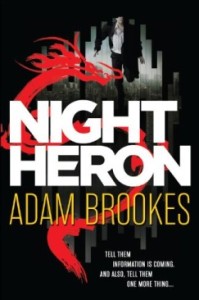
Posted: May 31st, 2014 | 1 Comment »
An interesting small footnote to World War One with a China link. Werner Otto von Hentig has long interested me a bit. Born in Berlin in 1886, von Hentig was a German diplomat who became a critic of the Nazis and who, though he served in the Third Reich, intervened to save Jews, and was instrumental in arranging for thousands of Jews to be transferred to from Germany to Palestine during the 1930s. Back in 1909 he had been assigned to the German Embassy (Legation) in Peking and was in the city for the 1911 revolution. He was wounded in WW1 and then appointed a leader to the German Mission to Kabul in 1915, a collective of Indian, German and Ottoman military and diplomatic personnel sent to Kabul to try to convince Emir Habibullah of Afghanistan to join the Central Powers and rise up in a Jihad against the British in India thereby distracting troops from the European front and the Dardanelles.
Â
Ultimately they failed to convince the Emir (who rather cleverly took bribes from the Germans and the British and then supported neither). Â The Indian nationalists remained to set up a Provisional Indian Government in exile which was disbanded in 1918. Von Hentig’s journey out of Kabul was eventual and a mad dash across Turkestan (Xinjiang is you must) and the Gobi eventually to Shanghai where he managed to get on a boat to America. The Americans then repatriated him back to Berlin with a failed mission but a hell of a dinner party story.
His memoirs of this time are, I think, pretty interesting – Von Kabul nach Shanghai – but only in German as far as I know and my schoolboy German is simply not up to it I’m afraid. If any Germans out there would care to read it and tell me any interesting thoughts von Hentig had on Peking and Shanghai I’d love to know….
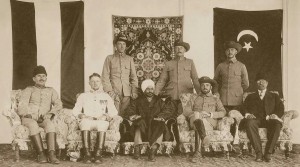
Left to right – Kâzım Orbay, Werner von Hentig, Walter Röhr, Mahendra Pratap, Kurt Wagner, Oskar Niedermayer, Günther Voigt and Maulavi Barkatullah
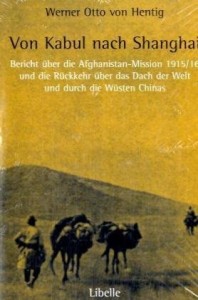
Posted: May 30th, 2014 | No Comments »
Alex Monro’s (an old Shanghailander himself of recent vintage) The Paper Trail is now out….
The story of how a Chinese invention has wrapped itself around our world,
with history’s most momentous ideas etched upon its surface
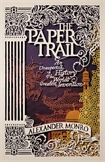
Â
Â
It can be eaten as rice paper or it can carry regurgitated food as an airplane sick bag. Paper can cover a spot and it can cut a finger. Children have made handheld aeroplanes out of it and assassins have moistened it to block a sleeping victim’s nostrils before strangulation. It can last for hundreds of years but it can also disappear with moisture in minutes or be eaten by bookworms in a few days. It can be as mundane and practical as a bus ticket or it can be as prized and expensive as the interface of the world’s greatest paintings.
Â
The Paper Trail tells the story of how a simple Chinese product has for two millennia allowed knowledge, ideas and religions to spread at an unprecedented rate around the world.
Â
Alex Monro traces this groundbreaking invention’s voyage, beginning with the Buddhist translators responsible for its spread across China and Japan, and follows it westward along the Silk Road, where it eventually became the surface of the Quran.
Â
Once paper reached Europe, it became indispensable to the scholars who manufactured the Renaissance and Reformation from their desks. As Monro uncovers, paper created a world in which free thinking could flourish, and brought disciplines from science to music into a new age.
Â
Alex Monro studied Chinese at the University of Cambridge and in Beijing before working for The Times in London and for Reuters in Shanghai. He has contributed chapters to The Dragon Throne (a history of China’s dynasties) and The Seventy Great Journeys in History, and edited two travel poetry anthologies, including China: City and Exile.
Â
In 2011, he won the Royal Society of Literature’s Jerwood Award for Non-Fiction for The Paper Trail. He lives with his wife in the Cotswolds, and writes on contemporary China.
Posted: May 29th, 2014 | 1 Comment »
Jacques Deval (who’s real name was Jacques Boularan) was a French writer, playwright and director born in 1875. His is perhaps now best remembered for his play Tovaritch that became a 1937 film of the same name starring Claudette Colbert and Charles Boyer, a classic tale of White Russians fled to Paris.
However Boularan/Deval also wrote a journal of his trip to the Far East entitled Rives Pacifiques (Pacific Rivers, I guess, though to my knowledge it’s never been translated into English), published by Gallimard in 1937. Therefore Deval straddles two interests of mine – Paris and Asia in the 1930s.

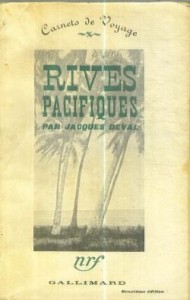
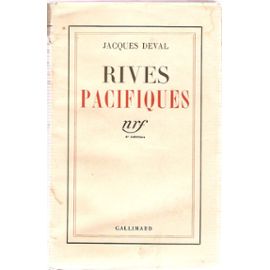
Posted: May 28th, 2014 | 2 Comments »
I’ve blogged previously about the Shanghai Restaurant, food Emporium and related branded cookbook from 1936 (nothing new in publishing!) that once stood on Soho’s Greek Street. In 1932 The Queenslander newspaper, surveying London’s Chinese restaurant scene wrote, “The “Shanghai†is much frequented by literary types, and has been “mentioned more than once in the public prints.†Only the old archway of the Manette Street hostelry divides the Shanghai restaurant from the large provision shop recently opened under the same management. Taking the very narrow path through the old archway, and turning to the right, we are upon another Canton restaurant, occupying a large first floor in Charing Cross Road. This is the only restaurant in London that reminds us of the hundreds of similar establishments in America, where one has a choice of over 600 Chinese restaurants in New York City alone.”
Here then is Greek Street in 1932 with the Chinese restaurant cluster poking in on the far left…..
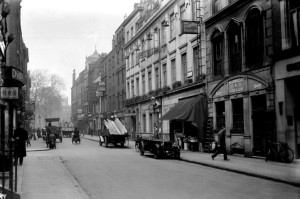
Posted: May 28th, 2014 | No Comments »
Rana Mitter’s history of China during the Second World War is now out in paperback….
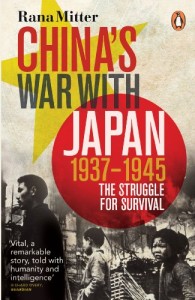
Different countries give different opening dates for the period of the Second World War, but perhaps the most compelling is 1937, when the ‘Marco Polo Bridge Incident’ plunged China and Japan into a conflict of extraordinary duration and ferocity – a war which would result in many millions of deaths and completely reshape East Asia in ways which we continue to confront today.
With great vividness and narrative drive Rana Mitter’s book draws on a huge range of new sources to recreate this terrible conflict. He writes both about the major leaders (Chiang Kaishek, Mao Zedong and Wang Jingwei) and about the ordinary people swept up by terrible times. Mitter puts at the heart of our understanding of the Second World War that it was Japan’s failure to defeat China which was the key dynamic for what happened in Asia.
Posted: May 27th, 2014 | No Comments »
A new history of The Taiping Heavenly Kingdom from Thomas Reilly…..
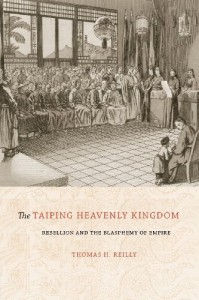
Occupying much of imperial China’s Yangzi River heartland and costing more than twenty million lives, the Taiping Rebellion (1851-64) was no ordinary peasant revolt. What most distinguished this dramatic upheaval from earlier rebellions were the spiritual beliefs of the rebels. The core of the Taiping faith focused on the belief that Shangdi, the high God of classical China, had chosen the Taiping leader, Hong Xiuquan, to establish his Heavenly Kingdom on Earth.
How were the Taiping rebels, professing this new creed, able to mount their rebellion and recruit multitudes of followers in their sweep through the empire? Thomas Reilly argues that the Taiping faith, although kindled by Protestant sources, developed into a dynamic new Chinese religion whose conception of its sovereign deity challenged the legitimacy of the Chinese empire. The Taiping rebels denounced the divine pretensions of the imperial title and the sacred character of the imperial office as blasphemous usurpations of Shangdi’s title and position. In place of the imperial institution, the rebels called for restoration of the classical system of kingship. Previous rebellions had declared their contemporary dynasties corrupt and therefore in need of revival; the Taiping, by contrast, branded the entire imperial order blasphemous and in need of replacement.
In this study, Reilly emphasizes the Christian elements of the Taiping faith, showing how Protestant missionaries built on earlier Catholic efforts to translate Christianity into a Chinese idiom. Prior studies of the rebellion have failed to appreciate how Hong Xiuquan’s interpretation of Christianity connected the Taiping faith to an imperial Chinese cultural and religious context. The Taiping Heavenly Kingdom shows how the Bible – in particular, a Chinese translation of the Old Testament – profoundly influenced Hong and his followers, leading them to understand the first three of the Ten Commandments as an indictment of the imperial order. The rebels thus sought to destroy imperial culture along with its institutions and Confucian underpinnings, all of which they regarded as blasphemous. Strongly iconoclastic, the Taiping followers smashed religious statues and imperially approved icons throughout the lands they conquered. By such actions the Taiping Rebellion transformed – at least for its followers but to some extent for all Chinese – how Chinese people thought about religion, the imperial title and office, and the entire traditional imperial and Confucian order.
This book makes a major contribution to the study of the Taiping Rebellion and to our understanding of the ideology of both the rebels and the traditional imperial order they opposed. It will appeal to scholars in the fields of Chinese history, religion, and culture and of Christian theology and church history.
Thomas H. Reilly is assistant professor of Chinese history and Asian studies at Pepperdine University











